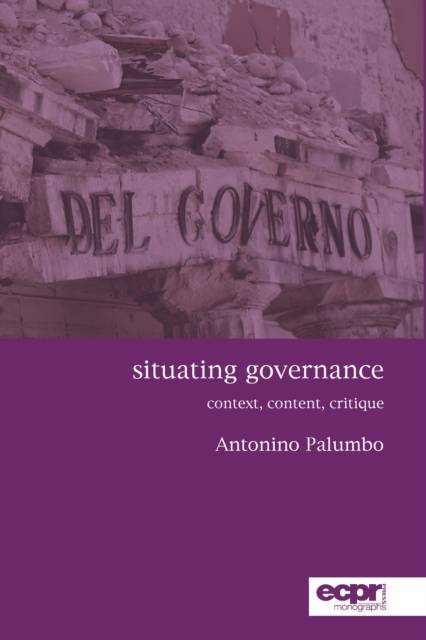
- Afhalen na 1 uur in een winkel met voorraad
- Gratis thuislevering in België vanaf € 30
- Ruim aanbod met 7 miljoen producten
- Afhalen na 1 uur in een winkel met voorraad
- Gratis thuislevering in België vanaf € 30
- Ruim aanbod met 7 miljoen producten
Zoeken
€ 73,45
+ 146 punten
Omschrijving
Governance studies present the Regulatory State or the Networked Polity as superior functional solutions to the welfarist forms of government established after the Second World War. Recalling the criticisms advanced by a rising second generation of research, Palumbo warns instead about the growing accountability gap and democratic deficit caused by the development of governance regimes at local, national and transnational level. In hollowing out traditional liberal democratic institutions, new modes of governance are ushering in a post-democratic policy environment that is reinforcing the legitimacy crisis affecting representative institutions worldwide. By contrast with other critical accounts since the 2008 financial crisis, this book shows that the current post-democratic drift is due neither to the hegemonic power acquired by neoliberal ideas nor to the pressures exercised by impersonal systemic forces. As result, it puts forward a political reading of change that casts a new light on both state activism and restructuring.
Specificaties
Betrokkenen
- Auteur(s):
- Uitgeverij:
Inhoud
- Aantal bladzijden:
- 366
- Taal:
- Engels
Eigenschappen
- Productcode (EAN):
- 9781907301681
- Verschijningsdatum:
- 1/11/2015
- Uitvoering:
- Paperback
- Formaat:
- Trade paperback (VS)
- Afmetingen:
- 156 mm x 234 mm
- Gewicht:
- 526 g

Alleen bij Standaard Boekhandel
+ 146 punten op je klantenkaart van Standaard Boekhandel
Beoordelingen
We publiceren alleen reviews die voldoen aan de voorwaarden voor reviews. Bekijk onze voorwaarden voor reviews.











